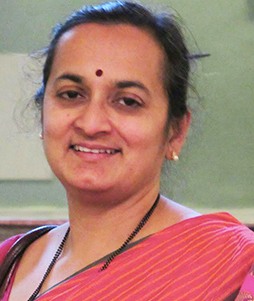
How can India become a great country again?
If you discount the rhetoric naysayers might see in the question, you will see some strong, plausible rationale that can be offered in its substantivity. A well-researched comprehensive book by Meeta and Rajivlochan is a treatise that objectively dwells and evaluates the issue. An IAS officer of the Maharashtra cadre, Meeta Rajivlochan has adorned important positions in administration including the Additional Director General of Foreign Trade (ADGFT) and Secretary, Department of Public Health and Secretary, Department of Finance. With 25 years of experience behind her, she has the right qualifications to discuss the issue threadbare and in its entirety. Indeed, it comes with a historical perspective and connects it with the situation as it stands today.
Ms Meeta has been extensively involved in facilitating leadership in urban local bodies to prepare and execute plans to improve services provided to citizens. Thanks to the institutional improvements effected, over 200 municipal councils in the state have operationalized customer care centers for sanitation services and at least six towns located in differing regions ranging from the Konkan to Vidarbha, have achieved significant successes in Mission Clean Up. She is also concerned with improving levels of per capita income through measures aimed at providing livelihood to the urban poor. As Secretary (Health) her role has concerned improvement in facilities in health care, with a view to making health care services more accessible and affordable.
The country has made rapid strides in all spheres – Science, Technology, and Business – in the 70-plus years of its Independence but somewhere along the way, the right matrix of development seems to be amiss. The failure to build robust institutional networks of information and trust coupled with the indifference of the state have not helped the country’s cause. Obsolete patterns continue to be followed with the result the key parameter of wealth creation has not gathered the right momentum. Although innovation was never in short supply, the ability to learn from experience was deficient. The book makes out a case for creating a learning ecosystem that can be leveraged to unlock the huge talent pool that India possesses.
The book issues a clarion call to aspiring Indians – across all walks of life – and offers tangible and tenable solutions to the problems the nation confronts today. To all those who would care to take a leaf out of the country’s history, especially students of History, Political Science, Public Administration and Business Administration, the book serves as a splendid reference material.
She has looked closely at the relationship between information and productivity in modern India and the pivotal role played by institutions in systematizing information, attributing the failure to systematize information to the famines in Bengal, once the richest of provinces. The authors also dwell on the methods of using information in three sectors deemed to be important to any economy — Banking, Technology for making iron and steel and pure science insofar as the discipline of mathematics is concerned.
Noting that Innovations that are institutionalized over time are key indicators of this progress, the authors argue that the ability to create wealth has much to do with building robust institutional networks of information and trust and that the indifference of the state to business communities has been a bottleneck. Never was the contrast more visible than after the arrival of the East India Company which did not initially have a level-playing field but changed the way business was done with their superior systems. They were more systematic in collating information in a scientific manner and using that to optimize productivity, they observe.
The book looks at the Iron and Steel Industry in India, how despite producing some of the best steel in the world, it was unable to scale up production to match the demands of a rapidly industrializing world. It makes an imputation about lack of institutional support behind uneven distribution of skills in India. A college dropout like Bill Gates was a success because of institutional support system. Knowledge was important but knowledge systems remained distant for Indians in the past, hampering growth, it says.
The author duo says in very many words that development, which is an ongoing process, can help meet goals through a planned approach. They advocate ensuring security of property through systematization of land records and creation of unique IDs; improving the learning curve; creating a high order of skills among the working population; building resilient knowledge institutions; and improving productivity by scrapping archaic laws and perverse incentives.
The highest common factor is the problem of outreach — how to percolate the benefits to the teeming millions. Systematizing information for the purpose itself is compounded by problems like illiteracy and ignorance. This, they contend, cannot be an excuse for not making an effort. The past helps understand the present and prepares us for the future. The book is a work of great scholarly acumen providing contemporary insight into the impediments in progress.
To all those who wonder and are perplexed how and why India – a great nation once with a strong economy and a vibrant polity, boasting of great achievements in almost every field of learning — lost that advantage and why have we never been able to recover our past glory, the book attempts to provide an in-depth justification. The most welcome and cerebral part of the book is it has been able to pitch its logic without falling to the caprice of mere criticism. Rather than posing a question whether India can become great again, the book puts it more affirmatively and assertively as “Making India Great Again”. It indicates the confidence the authors have in their deductions.
The book is available on Amazon as kindle and hard cover edition:
https:// www.amazon.in/Making-India-Great-Again-Learning/dp/9390035201/ref=tmm_hrd_swatch_0?_encoding=UTF8&qid=&sr=
Ms Meeta has also authored books titled “Farmers Suicide: Facts and Possible Policy Interventions” and “Jal Swaraj: Case studies in Community Empowerment”.
[Making India Great Again: Learning from our History, written by Meeta and Rajivlochan, Published by Manohar Publishers & Distributors, Pages 299, Price Rs 1495]

A Column By
Raju Kotri – Editor
The Resource 24X7
A Journalist With 4 Decades of Experience With Leading Media Houses.
